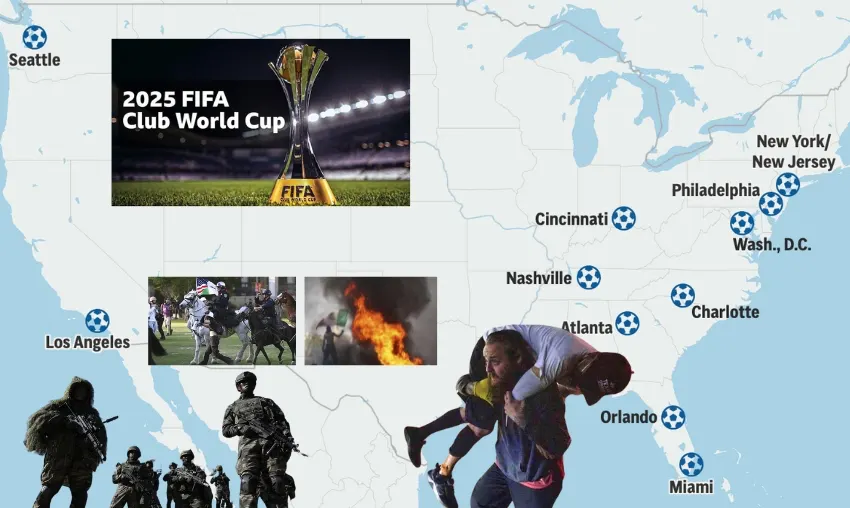There are moments when football betrays itself. When the game that captivates millions suddenly seems detached from the reality in which it takes place. The summer of 2025 is one such moment. In the United States – a country more politically torn than it has been in decades, responding to protests with Marines and enforcing immigration policy through fear – FIFA is celebrating a tournament of superlatives starting June 14: the first expanded FIFA Club World Cup with 32 teams. It runs through July 13. A show of records. A show for the markets. A show without morality.
That it is the United States, of all countries, that was awarded this project seems like a calculated decision – big stadiums, TV revenue, sponsorship deals, political proximity. That the very same USA is currently deploying National Guard troops against its own people, obstructing journalists, and even ejecting senators from press conferences seems irrelevant to world football’s governing body. “We believe in the unifying power of football – especially in difficult times,” a FIFA spokesman said in response to inquiries. An empty phrase that barely conceals FIFA’s true priority: money.
On the pitch: Real Madrid, Manchester City, Palmeiras, Al Ahly, Auckland City, Club León – all traveling to claim the crown of world football. But not everyone is allowed. While players like Ayrton Costa of Boca Juniors were scratched due to visa issues, fear is growing among fans as well. Trump’s new travel order includes exceptions for players, coaches, and staff – but not for fans. The U.S. State Department confirmed, when asked, that spectators are not among the exempt groups.
Well-known football travel blogger Danny Navarro puts it bluntly: fans feel the uncertainty – they don’t know if they will be allowed to enter, and if they do, whether they’ll be stopped by ICE. That is not a climate for a global football celebration.
When tear gas fills the streets, no match can truly begin
In Los Angeles, one of the host cities, protests continue – against Trump’s deportation policies, against domestic military deployment, against the erosion of democratic principles. Yet while citizens outside confront mounted police, inside the grass is being trimmed, branding is being installed, and the anthem is being rehearsed. It is a contradiction that leaves even seasoned sports journalists speechless. “You cannot play the ball while the rule of law collapses next door,” wrote a commentator from Brazil’s Globo network.
The U.S. Travel Association is also sounding the alarm. President Geoff Freeman warned: in Colombia, the wait time for a U.S. visa is currently up to 18 months. “If we don’t act now, even the 2026 World Cup will already be out of reach for many fans.” But instead of solutions, the Trump administration is sending signals of deterrence: “If they don’t leave after the game is over, they’ll have to speak with Secretary Noem,” said Vice President JD Vance – a reference to deportation and control. Trust? Shattered. For weeks, the country has been debating the deployment of 4,000 National Guardsmen and 700 Marines in California. Federal Judge Charles R. Breyer declared the deployment unconstitutional – the appeals court reversed the decision in an emergency proceeding with no hearing. A legal scribble, as even conservative voices in California complained. In this climate of repression and arbitrariness, between rubber bullets and visa denials, the most global of all football festivals is now supposed to take place.
And FIFA? It plays on.
“We believe in neutrality,” comes the message from Zurich. But neutrality in the face of a regime that deports critics and attacks journalists is not neutrality – it is silent complicity. While Europe debates whether matches should even be played in countries with questionable human rights records, FIFA relocates its flagship tournament to a country where democratic principles are currently being systematically undermined.
These days, the ugliest side of modern football is on full display. Not on the pitch – there will still be magical moments, stunning combinations, goals to celebrate. But around it, there is a silence louder than any fan chant. Because when a tournament is used to distract from injustice, it is no longer a celebration of sport. It is PR – for an America in a state of emergency.

Kann Sport noch losgelöst von Politik sein?
Ich denke nicht.
Wir werden sehen ob alle anreisen und wie Fadenscheinig ihre Erklärung sind.
Wir werden gewahr werden wer Haltung zeigt.
…diese Veranstaltung ist eine Farce, das war sie bereits vorher, jetzt folgte der I-Punkt